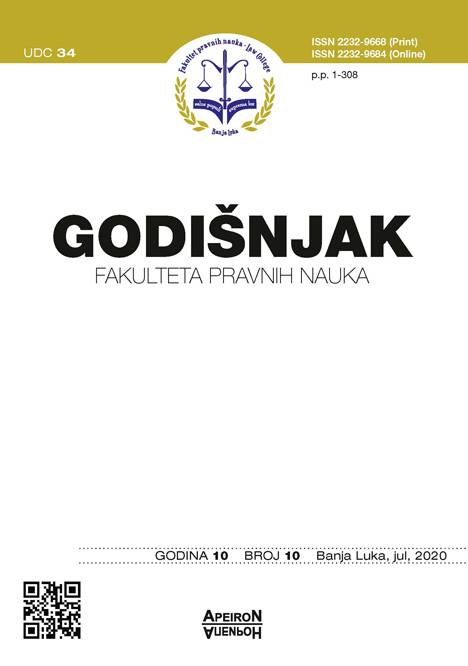Constitutional Court of Bosnia and Herzegovina as Positive Legislator
DOI:
https://doi.org/10.7251/GFP2010064SAbstract
The Constitutional Court of Bosnia and Herzegovina was established on the basis of Article VI of the Constitution of Bosnia and Herzegovina as an independent guardian of the Constitution of Bosnia and Herzegovina and an institutional guarantor of the protection of human rights and fundamental freedoms established by this Constitution and instruments of Annex I to the Constitution. Assuming that it is not part of the legislative, executive and regular judicial power (as positioned by the Constitution of Bosnia and Herzegovina), the Constitutional Court acts as a separate, autonomous and independent authority and a corrective factor for the other three segments of government in Bosnia and Herzegovina. In this way, the Constitutional Court, as one of the key state institutions of Bosnia and Herzegovina, contributes to the promotion of democracy, rule of law and the affirmation of the rule of law, especially in the first years after its constitution when it was necessary to protect the foundations of a democratic state and resolve a number of questions that have in some ways remained vague in the Constitution of Bosnia and Herzegovina.
The decisions of the Constitution are final and binding. In the end, the Constitutional Court has to seek and find out the ways for implementation of its decisions. If the legislator is not able to do that, the role of the guardian of the Constitution imposes on the Constitutional Court, even in the unpopular (realistically, rarely used) role of a positive legislator, to bring the procedure before the court to an end - by proclaiming a law on a temporary basis.
The paper explains the concept of judicial activism, its limitations and self-limitations. Then, it points out some of the most impressive forms of its realization in the case-law of the Constitutional Court, taking into account mutual influences and differences. Special emphasis is placed on the constitutional framework of constitutional court activism of the Constitutional Court, which is also the basis for the interpretation of the Constitution of Bosnia and Herzegovina.
